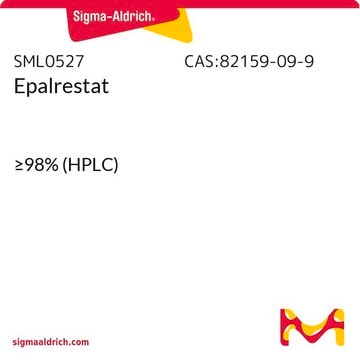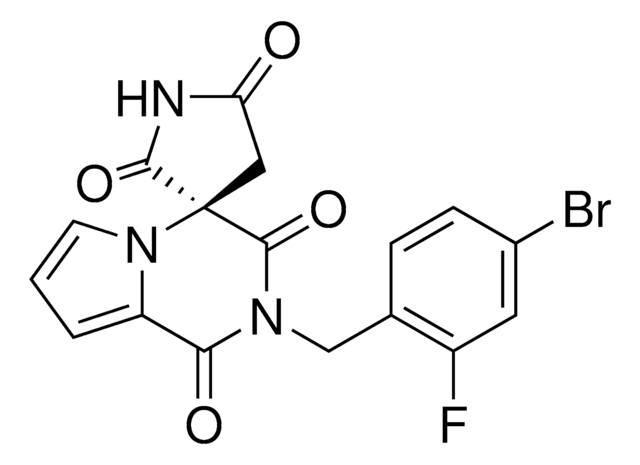S7701
Sorbinil
≥98% (HPLC)
Synonym(s):
(+)-(4S)-6-Fluorospiro[chroman-4,4′-imidazolidine]-2′,5′-dione, (4S)-6-Fluoro-2,3-dihydro-spiro[4H-1-benzopyran-4,4′-imidazolidine]-2′,5′-dione, CP 45634
About This Item
Recommended Products
Quality Level
Assay
≥98% (HPLC)
form
powder
optical activity
[α]/D +50 to +60°, c = 1 in methanol
color
white to off-white
solubility
DMSO: ≥20 mg/mL
storage temp.
2-8°C
SMILES string
Fc1ccc2OCC[C@]3(NC(=O)NC3=O)c2c1
InChI
1S/C11H9FN2O3/c12-6-1-2-8-7(5-6)11(3-4-17-8)9(15)13-10(16)14-11/h1-2,5H,3-4H2,(H2,13,14,15,16)/t11-/m0/s1
InChI key
LXANPKRCLVQAOG-NSHDSACASA-N
Application
Biochem/physiol Actions
Features and Benefits
Disclaimer
Signal Word
Warning
Hazard Statements
Precautionary Statements
Hazard Classifications
Acute Tox. 4 Oral
Storage Class Code
11 - Combustible Solids
WGK
WGK 3
Flash Point(F)
Not applicable
Flash Point(C)
Not applicable
Certificates of Analysis (COA)
Search for Certificates of Analysis (COA) by entering the products Lot/Batch Number. Lot and Batch Numbers can be found on a product’s label following the words ‘Lot’ or ‘Batch’.
Already Own This Product?
Find documentation for the products that you have recently purchased in the Document Library.
Articles
DISCOVER Bioactive Small Molecules for Nitric Oxide & Cell Stress Research
DISCOVER Bioactive Small Molecules for Nitric Oxide & Cell Stress Research
DISCOVER Bioactive Small Molecules for Nitric Oxide & Cell Stress Research
DISCOVER Bioactive Small Molecules for Nitric Oxide & Cell Stress Research
Our team of scientists has experience in all areas of research including Life Science, Material Science, Chemical Synthesis, Chromatography, Analytical and many others.
Contact Technical Service






